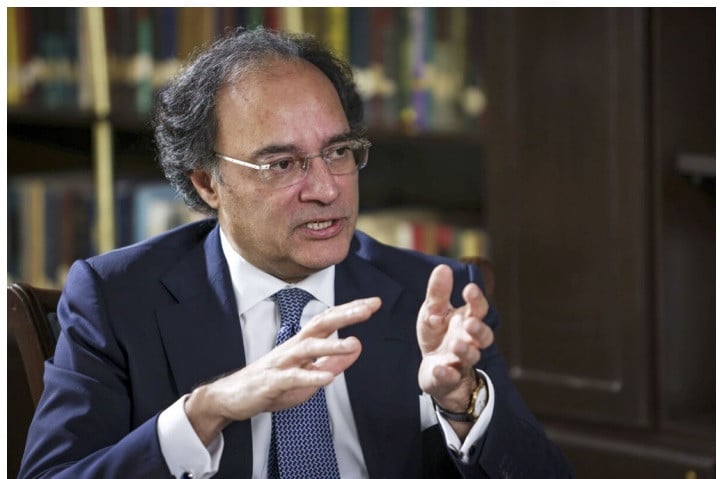By Staff Reporter
KARACHI: Finance Minister Muhammad Aurangzeb left for Washington on Saturday to attend the World Bank and International Monetary Fund (IMF) Spring Meetings, aiming to secure further financial support and reassure investors as the country implements reforms under a $7 billion IMF bailout program.
The meetings, scheduled for April 21-26, will bring together global financial leaders to discuss economic challenges and policy solutions. Aurangzeb is expected to hold talks with the IMF and World Bank officials, as well as finance ministers from China, Saudi Arabia, Turkiye, and Britain, the finance ministry said.
The minister will also meet U.S. State Department and Treasury officials, credit rating agencies, and representatives from commercial and investment banks to outline progress on fiscal reforms, including tax adjustments and energy subsidy cuts mandated by the IMF.
Pakistan’s economy remains fragile after narrowly avoiding default last year, with growth projected at 3 percent for the current fiscal year. Last month, the IMF completed its first review of Pakistan’s 37-month, $ 7 billion Extended Fund Facility, paving the way for the release of $1.1 billion. A separate $1.3 billion climate resilience loan under the IMF’s Resilience and Sustainability Trust (RST) was also agreed, pending board approval.
The government has pledged to broaden the tax base, reduce energy subsidies, and privatize state-owned enterprises to meet IMF targets.
Pakistan must repay $2 billion in external debt by the end of June, with the country’s foreign exchange reserves under pressure despite projections that they will rise to over $14 billion by mid-2025.
The country has total external payment obligations of $26 billion for the current fiscal year, of which $16 billion is expected to be rolled over or refinanced. Islamabad has already repaid $8 billion of the remaining $10 billion due, leaving $2 billion to be settled by June 30.
While foreign exchange reserves are forecast to climb to $14 billion by June 2025—enough to cover three months of imports—$16 billion of the refinanced debt consists of foreign deposits from allies like China, UAE and Saudi Arabia. This leaves the central bank’s net reserves at between $3 billion and $4 billion, insufficient to shield the rupee or ease import constraints.
“The finance minister will present Pakistan’s economic roadmap and reform agenda during engagements with international stakeholders,” the ministry said in a statement. Aurangzeb will participate in a roundtable hosted by Jefferies Group titled Pakistan’s Economic Outlook and speak at an event organized by the Centre for Global Development on reform challenges.
Aurangzeb will attend the 13th Ministerial Meeting of the Coalition of Finance Ministers for Climate Action, where he is expected to highlight Pakistan’s vulnerability to climate disasters, including catastrophic floods in 2022 that caused $30 billion in damages.
The minister will also meet Queen Máxima of the Netherlands, the U.N. Secretary-General’s special advocate for inclusive finance, and Gates Foundation officials to discuss social welfare programs.
Aurangzeb’s engagement with institutional investors and rating agencies is critical as Pakistan eyes a return to international bond markets. The country last tapped global markets in 2022 with a $1 billion sukuk issuance.
The Spring Meetings conclude on April 26, with Islamabad seeking swift disbursement of IMF funds and longer-term partnerships to stabilize its crisis-hit economy.
Copyright © 2021 Independent Pakistan | All rights reserved




